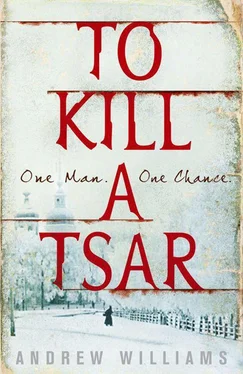On the 19th they transferred the body of Alexander II to the Cathedral of St Peter and St Paul, the fortress’s minute gun echoing along the Neva. The river was lined with tens of thousands of onlookers, many from the country, some to mourn, some only to enjoy the spectacle. And as the long cortège of soldiers and civil representatives left the palace the city’s bells began to toll, their solemn note reaching into every home and even into the subterranean cells of the Secret House. For the first time in days Anna left the apartment seeking the anonymity of the crowded streets. She dressed in her old brown woollen coat, a little tight now, with Mikhailov’s burgundy scarf pulled up over her face. To feel the sharp air in her chest, the crunch of snow underfoot, to find relief in exercise, the stiffness leaving her body, and put the gloom of the last days, the staleness of the apartment behind her. Perhaps it was the freedom she allowed herself in the fresh air to think again of a time when she might be with Frederick that caused her to lower her guard for once. Was it in the Haymarket or on the Nevsky Prospekt? She was never quite sure. But at some point she was seen and followed by a ‘pea-green coat’, as the party liked to call the police department’s spies. He waited until she turned on to the Fontanka Embankment, then grabbed her roughly from behind. ‘Thief, thief!’ she screamed and managed to break free. She ran into a yard and to the back door of a mansion, but the dvornik had been roused by the commotion and met her on the stairs, driving her from the building. It was only a matter of seconds before they were upon her.
They drove her to Fontanka 16 and then to the studio of Alexandrovsky and Taube on the Nevsky for a police photograph. By the time she returned to the Third Section its corridors were crammed with agents and officials from the justice ministry loitering in the hope of catching a glimpse of another of the regicides. She was taken to the basement and locked in a cell with a guard to watch her at all times. The sergeant in charge of the prisoners refused to listen to her appeal for some privacy to go to the toilet. For an hour or so she sat at the edge of the bench with a dull pain in her chest, resigned to what she had long believed to be inevitable. She tried not to think of her baby. In the early evening a doctor — an elderly sober-suited German — came to examine her. Again the sergeant refused to remove the guard. She said nothing to the doctor of her pregnancy but after examining her for a few minutes, he placed his stethoscope on her belly. Then he lifted his round brown eyes to her face and gave her a knowing look.
He left without saying anything more than that she was in good health. A short time later the collegiate councillor called Dobrshinsky, whom she knew to be the special investigator, came to inform her that some dignitaries were waiting in his office to see her. He escorted her under guard up the broad marble stairs to the second floor. Then, with more graciousness than she expected, he introduced the two men who were sitting at his desk as the chief prosecutor, Count von Plehve, and General Sereda of the Gendarme Corps. A chair had been set for her in the middle of the room.
‘Is it the jealousy of the peasant, Madame Romanko?’ von Plehve asked contemptuously, as soon as she had settled. He was fidgeting restlessly with a pen, a high colour in his cheeks. ‘Is that why you became a nihilist?’
She stared at him unmoved.
The count was needled by her refusal to reply. ‘We have a witness that places you on the embankment — he spoke to you only minutes before His Majesty was murdered. It will hang you.’
Again Anna refused to be drawn.
‘Your only hope of escaping the gallows is if you help us,’ he barked, his elbows on the desk, hands clasped together in a large fist.
Anna noticed the suggestion of a frown on Dobrshinsky’s face as if he disapproved of the count’s bullying manner. Frederick had spoken of the special investigator with grudging admiration, describing him as a ‘subtle Pole’.
But it was General Sereda who spoke next. ‘You seem so small. So unassuming.’ He was quiet and considerate in his address, like an avuncular old priest.
‘Were you expecting someone with two heads?’ she asked with a wry smile.
‘Precious little brain for one,’ said von Plehve, breaking in belligerently, ‘but a great deal of unruly passion.’
The general ignored him. ‘What did you hope to achieve? Do you know the tsar signed a draft law to introduce reforms only hours before he died?’
‘There is nothing I want to say before my trial,’ Anna said, determined not to be drawn into a political discussion.
‘Why didn’t you have children, Madame Romanko?’
‘My name is Anna Kovalenko.’
‘If you had had children this would never have happened to you,’ the general said with a little shake of the head.
Anna could not help smiling at this strange observation. She sensed that, although the general was hopelessly misguided and old-fashioned, he meant well.
‘Enough of this nonsense!’ von Plehve blustered. ‘Madame Romanko, you will go on trial alongside your comrades in the next few days. The outcome is a foregone conclusion unless you help us.’
Anna frowned but said nothing. What was the point?
‘And what of your lover?’ he continued, a mean little smile in his eyes. ‘Your English doctor. Do you think of him? What a strange hold you have on his imagination. You can help him.’
She flushed a little but did not reply.
‘It might be possible for him to go free.’
After a pause, she said: ‘Frederick Hadfield has done nothing. He knows nothing.’
But the count was not satisfied and fired questions and threats at her for another ten minutes, working himself into a mighty rage. Finally, he gave up, issuing orders to the guard to take her back to her cell. She assumed that would be the last she would see of her interrogators until the morning. But two hours later she was woken from a light sleep and escorted back to the office to face the special investigator alone. He offered her something to eat and she accepted some tea.
‘But you should eat to keep up your strength,’ he said gently. ‘Prison food is very insubstantial.’
But she was only interested in the tea. Dobrshinsky summoned a clerk from his outer office and gave him instructions, and a few minutes later he returned with a pot and glasses and also a little vodka.
‘I hope you’ll forgive the chief prosecutor’s intemperate display, Anna Petrovna,’ said Dobrshinsky, pouring her a glass and pushing it across his desk towards her. ‘He does not understand that you and your comrades love Russia and her people as much as we do.’
So reasonable, so plausible, Anna thought; he is as wily as a fox.
‘Ah, you smile,’ he said. ‘But I know your political programme as well as you, and there is much that you ask for that I would support — an elected assembly, freedom of speech and press — I share these aspirations too.’ He leant across his desk, his small dark eyes not flickering from her face.
‘The tsar is dead but where is your revolution? That is not the will of the people at all. They want change, yes, but not violence. Grigory Goldenberg understood this,’ he added, ‘that is why he was prepared to help me.’
‘Poor Grigory was tricked by smooth words and he knew it, and that’s why he took his own life,’ she said curtly. ‘I won’t make the same mistake.’
‘It’s over. The People’s Will is finished. It died on the embankment with the tsar. Who of importance is left? Only Vera Figner.’ He paused, his eyes scrutinising her face for any sign of weakness or emotion. ‘And I am sorry to say Count von Plehve is right — your closest comrades will be executed — even Sophia Perovskaya.’ He noticed her body tense.
Читать дальше












